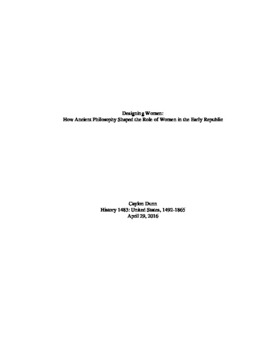| dc.creator | Dunn, Caylon | |
| dc.date.accessioned | 2016-08-29T15:18:49Z | |
| dc.date.accessioned | 2021-04-14T15:26:03Z | |
| dc.date.available | 2016-08-29T15:18:49Z | |
| dc.date.available | 2021-04-14T15:26:03Z | |
| dc.date.issued | 2016 | |
| dc.identifier.uri | https://hdl.handle.net/11244.46/103 | |
| dc.description.abstract | For a span of one hundred and forty-four years, from the official founding of the country until the passage of the 19th amendment to the Constitution, women in the United States of America did not have the right to vote. How could a nation which so openly touted the principles of freedom and equality commit such an egregious error as to disenfranchise what comprised nearly half of its “free” population for well over half of its existence? To answer this question, it becomes necessary to examine the principles which influenced the founders of the nation and further, to explore how those ideas were implemented and sustained in the rapidly evolving milieu of the post-revolutionary republic. In particular, Aristotelian ideas on public and private virtue and the education necessary for achieving success in those ventures had a dramatic and lasting impact on women’s roles in society that can still be seen today. In the early Republic, women assumed the role of republican wives, masters and purveyors of virtue in the private sphere, intended to shore up and complement their virtuous male counterparts in the public sphere. Over time, women began to see themselves less as counterparts to their husbands and more as equals. This led to an increased demand from women for equality in education and exposure to the public realm previously reserved for men, causing the lines between the public and private spheres to become eroded. It was believed that the success of the republic depended on whether or not virtue could be achieved in both the public and private spheres, but that these realms should remain clearly delineated and controlled by their respectively assigned caretakers. Counter-current to women’s push for equality in the public sphere through education in their role as wives ran the idea that women better served the republic by remaining in the private sphere and being educated as mothers. | en_US |
| dc.format.extent | 12 pages | |
| dc.format.extent | 377,386 bytes | |
| dc.format.medium | application.pdf | |
| dc.language.iso | en_US | en_US |
| dc.relation.requires | Adobe Acrobat Reader | |
| dc.rights | Attribution-NonCommercial-ShareAlike 3.0 United States | * |
| dc.rights.uri | https://creativecommons.org/licenses/by-nc-sa/3.0/us/ | * |
| dc.subject | David W. Levy Prize Finalist | en_US |
| dc.subject.lcsh | Sex role -- United States -- History -- 18th century | en_US |
| dc.subject.lcsh | Feminism -- United States -- History -- 18th century | en_US |
| dc.subject.lcsh | Women -- United States -- Social conditions -- 18th century | en_US |
| dc.subject.lcsh | United States -- Civilization -- Greek influences | en_US |
| dc.subject.lcsh | United States -- Politics and government -- 1783-1809 | |
| dc.title | Designing women : how ancient philosophy shaped the role of women in the early republic | en_US |
| dc.type | Document | |
| dc.type | text | |
| ou.course.dept | HIST | en_US |
| ou.course.number | 1483 | |
| ou.teacher | Buchkoski, John | en_US |
| ou.faculty | Kelly, Dr. Catherine | en_US |
| dc.description.undergraduate | undergraduate | |

